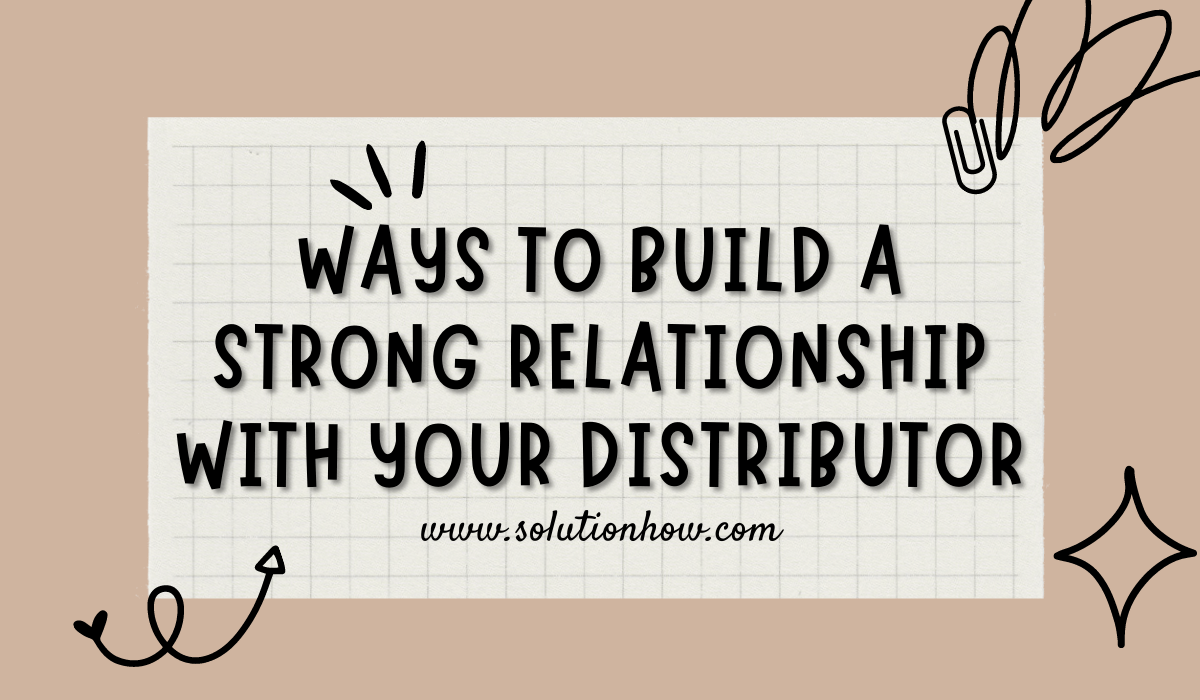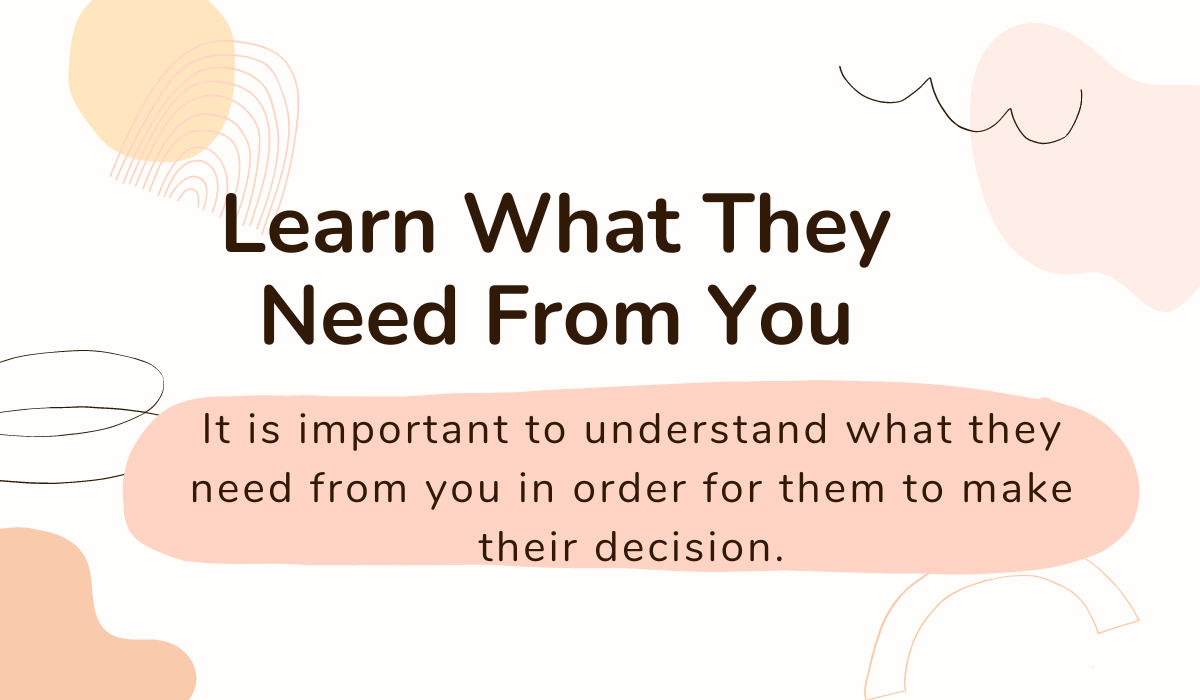
How to Build Strong Relationship With Your Distributor
Building a strong relationship with your distributor is essential for any business to succeed. The right distributor can help you get the best possible price and delivery times for products, as well as provide specialized advice on the products that you need. By creating a strong bond with your distributor, you’ll be able to maximize your sales potential and bring better value to customers.
The key to building a great relationship with your distributor is communication. Make sure that you are always in contact with them, so they understand what product lines or services they should offer you and what sort of delivery timeline works best for both of you. You should also ensure that their customer service is up-to-par by closely monitoring their response time and willingness to assist when needed. Additionally, make sure that there are clear expectations set between both parties regarding how payments will be handled, how orders will be fulfilled, etc. Before signing anything, you should run them through an Indonesia company registry to make sure they are legit and have nothing flagged about their business.
Establishing and maintaining a healthy relationship with your distributor can help you get access to new products, more competitive prices, and better customer service. It is also important for keeping up with industry trends and staying ahead of the competition.
When building a strong relationship with your distributor, there are several things you can do to ensure that it lasts. Start by establishing clear communication channels between both parties: make sure you communicate expectations, goals, and deadlines clearly. Develop trust by being open and honest about your needs and concerns, as well as any issues or problems that may arise in the future. Finally, be sure to show appreciation for their efforts; thank them for their hard work and suggest ways they can improve if needed. This will go a long way towards fostering an ongoing successful working relationship between you both.
1. Meet With Your Distributor In Person

Meet With Your Distributor In Person
The key to building a strong relationship with distributor is to meet with them in person. This doesn’t have to be an in-depth meeting, but simply setting aside time for a conversation can go a long way. Meeting face-to-face allows you and your distributor the opportunity to build trust and gain insight into each other’s expectations. Investing the time up front can help ensure that both parties are on the same page when it comes to sales goals and strategies, as well as provide insight into any issues or concerns that may arise during their partnership.
The meeting should include topics such as goals for both parties, how they will work together on marketing initiatives, what types of products or services they expect from each other, any potential problems that could arise with current or future orders and payment terms.
2. Pay Your Distributor On Time
The importance of having a strong relationship with your distributor cannot be understated. A successful business relationship between you and the person responsible for getting your products to consumers is key. As an effective strategy, it is essential that you pay on time in order to build a healthy rapport with your distributor.

Pay Your Distributor On Time
When working with distributors, regular communication and updates are vital in building trust and reliability. Additionally, making sure to pay invoices by their due date helps maintain a good reputation so that they will remain eager to work together in the future. By understanding this concept, you can ensure that the relationship between yourself and your distributor remains strong for the foreseeable future.
Moreover, delivering consistent quality products paired with timely payments reinforces dependability within all aspects of your business dealings with them.
3. Keep An Open Line Of Communication
Maintaining a strong relationship with your distributor is essential for the success of your business. Establishing an open line of communication between you and your distributor can help ensure that you are both on the same page when it comes to meeting customer expectations.

Be sure to have frequent conversations. Keeping in touch consistently allows both parties to stay up-to-date on news, trends, and updates related to their products or services. This open line of communication also helps ensure that any questions or concerns are addressed quickly and efficiently. Additionally, having regular meetings provides an opportunity for meaningful feedback so that you can make informed decisions about how best to serve customers’ needs.
Offer support where possible. Distributors often face tight deadlines and complex challenges when trying to meet customer demands.
4. Talk About Opportunities To Work Together

Talk About Opportunities To Work Together
Building a strong relationship with your distributor is essential to ensure the success of any business. Distributors are key intermediaries in the supply chain, responsible for providing products to retailers and customers. To maximize the benefits of working with a distributor, businesses should discuss potential opportunities that can be mutually beneficial.
Start by getting to know your distributor on an individual basis and understand their goals, needs, and challenges. This will allow you to build trust and create constructive dialogue about areas where collaboration can improve efficiency or profitability for both parties. After establishing a good rapport, you can move forward in discussing ideas such as joint marketing campaigns or leveraging each other’s strengths when it comes to product development. A partnership between two companies could also potentially increase sales by expanding distribution channels or introducing new products into existing markets.
5. Learn What They Need From You

Learn What They Need From You
It’s no surprise that sales are an important part of any business, and so it’s essential to be able to get the best possible deal from distributors. With this in mind, it is important to understand what they need from you in order for them to make their decision. Knowing the right things can help you ensure a successful sale and maximize profits.
The first thing that distributors need is trustworthiness. Before they agree to do business with you, they will want to know that they can rely on your product or service. Showing reliability and consistency will go a long way in building distributor trust and ensuring you reach agreement faster.

Learn What They Need From You
Another key factor in success is being organized and prepared for any questions or concerns a distributor might have about your product or service.
6. Attend In Distributor Meetings

Attend In Distributor Meetings
Having a strong relationship with your distributor can make your business well. Distributors are a critical link between manufacturers and retailers, so if you want to succeed in the retail world, having a good rapport with your distributors is vital. One of the best ways to build a strong relationship with them is by attending their meetings.
Attending distributor meetings provides an opportunity for you to show that you value their opinion and expertise. It also allows you to stay up-to-date on any new products or changes in the industry, as well as introducing yourself and establishing relationships that could prove useful down the line. It’s also an excellent way to get feedback from distributors about your product offerings, enabling you to adjust accordingly for better success in sales.
Accordingly For Better Success In Sales.
7. You Need To Ensure That You’re Getting The Best Possible Deal From Distributor

Get Best Possible Deal From Distributor
With sales being such a competitive business, it’s essential to make sure that you’re getting the best deal possible from your distributor. Accordingly, for better success in sales, you need to ensure that you’re taking advantage of all the discounts and incentives available from your distributors. This will help ensure that your profits stay high while at the same time helping to differentiate your business from the competition.
There are several steps that you can take to make sure that you’re getting the most out of your distributor relationships. First, do research on different distributors and compare their pricing and services. Next, talk with them directly about any special offers they may have available or if they’re willing to negotiate prices or terms in order to get a better deal for both parties.
8. Don’t Blame Distributors

Don’t Blame Distributors
Are you frustrated with the performance of your distributor? Do you feel like they’re not working hard enough to promote your product or service? While it is true that distributors will play a major role in the success of your business, it’s important to remember that they are a partner and deserve respect. Building a strong relationship with them can help both sides achieve their goals.
Good communication between you and your distributor is key. Make sure everyone involved is on the same page about expectations and timelines for product delivery, pricing structures, sales targets, and more. Additionally, be open-minded when discussing any problems or issues that may arise – don’t immediately blame distributors for anything that goes wrong. A little patience can go a long way towards resolving conflicts quickly and keeping the relationship healthy in the long run.
What Is Distributor Relationship Management?
Distributor Relationship Management (DRM) is an important and often overlooked component of business operations. DRM is the practice of managing relationships between customers and distributors in order to better serve customers. When used correctly, it can help facilitate efficient supply chain management, reduce costs associated with inventory holding, improve customer service and loyalty, as well as increase sales through more effective marketing strategies.
At its core, DRM involves understanding the needs of both buyers and sellers in a relationship. This means that communication must be open between all parties involved. For example, a customers might use DRM to determine what products are most popular with their distributor’s customers or to find out if there are any new trends emerging in the industry that could affect demand for certain products. The customers then works with their distributor to identify ways to meet these demands while also maximizing profits for both parties involved.
How To Communicate With Distributors?
Effective communication is essential for a successful relationship between businesses and their distributors. Knowing how to communicate effectively can help minimize misunderstandings and ensure that needs are met on both sides of the business relationship. Here are some tips to help you communicate effectively with your distributors.
The first step in effective communication is making sure that all information is clear and concise. This means avoiding jargon or complicated language, and ensuring that the recipient understands the message being conveyed by using everyday language whenever possible. Additionally, it’s important to be direct when communicating with distributors; this will help avoid confusion or misunderstanding while also conveying respect for their time and expertise.
Another important element of effective communication with distributors is providing feedback promptly. Distributors need accurate information as soon as possible so they can begin working on projects or tasks efficiently, so responding promptly helps keep the process moving along smoothly.
Why Is It Important To Build Relationships With Distributors?
Having strong relationships with Distributors is essential to any successful business. It’s important to build and maintain those relationships in order to ensure that you have the right products and services needed for your company. v can offer a variety of benefits, such as cost savings, improved quality control, better supply chain management, faster delivery times and greater flexibility when it comes to product customization.
Developing trust with Distributors is also key in order for businesses to stay competitive in the market. When both sides understand each other’s needs and expectations, they can work together more effectively and efficiently. Furthermore, building close ties with Distributors allows customers to benefit from their expertise in their field which could result in cost-savings or improved products or services over time. Additionally, it may be easier for companies to negotiate prices or access discounts if there is an established relationship between Distributors and customer.
What Kind Of Relationship Should The Manufacturer Develop With Distributors?
Manufacturers and distributors play an important role in the success of any product. By understanding the importance of developing a strong relationship between manufacturer and distributor, manufacturers can ensure their product is well-positioned for success in the market place. But what kind of relationship should the manufacturer develop with distributors?
The first step for creating a beneficial relationship between manufacturers and distributors is to gain trust. This means that both parties must be open and honest about their expectations regarding pricing, delivery times, inventory levels, product quality and more. Manufacturers must also keep up with changes in market conditions so they can provide better service to their customers at the right price point. With this level of trust established, manufacturers will be able to work together with their distributors to create a mutually beneficial partnership that supports growth on both sides.
How Do You Manage Relationships With Distributors?
- Segment your Distributors
- Treat Distributors like partners
- Examine Distributors experience
- Plan for, then handle disruptions
- Be adaptable about your RFP
- Show you mean it
- Capitalize on technology
- Make SRM an organizational priority
What Are Three Requirements Of Good Distributors Relationships?
- Commitment
- Communication
- Cooperation
Good Distributors relationships are essential to the success of a business. Distributors provide products and services that directly impact operations, and strong relationships ensure that businesses are getting what they need when they need it. There are three key requirements for establishing successful Distributors partnerships: trust, communication, and mutual understanding.
Trust is one of the most important components in any relationship; it forms the foundation upon which success can be built. When both parties have faith in each other’s motivations and capabilities, expectations can be met without worry or hesitation. Establishing trust requires an investment of time and effort from both sides; learning about one another’s goals and priorities is essential for building solid foundations for a partnership.
Communication is also key to effective Distributors relationships. Being open with partners about needs and expectations helps to remove potential surprises or misunderstandings down the line.
Thanks for reading.






